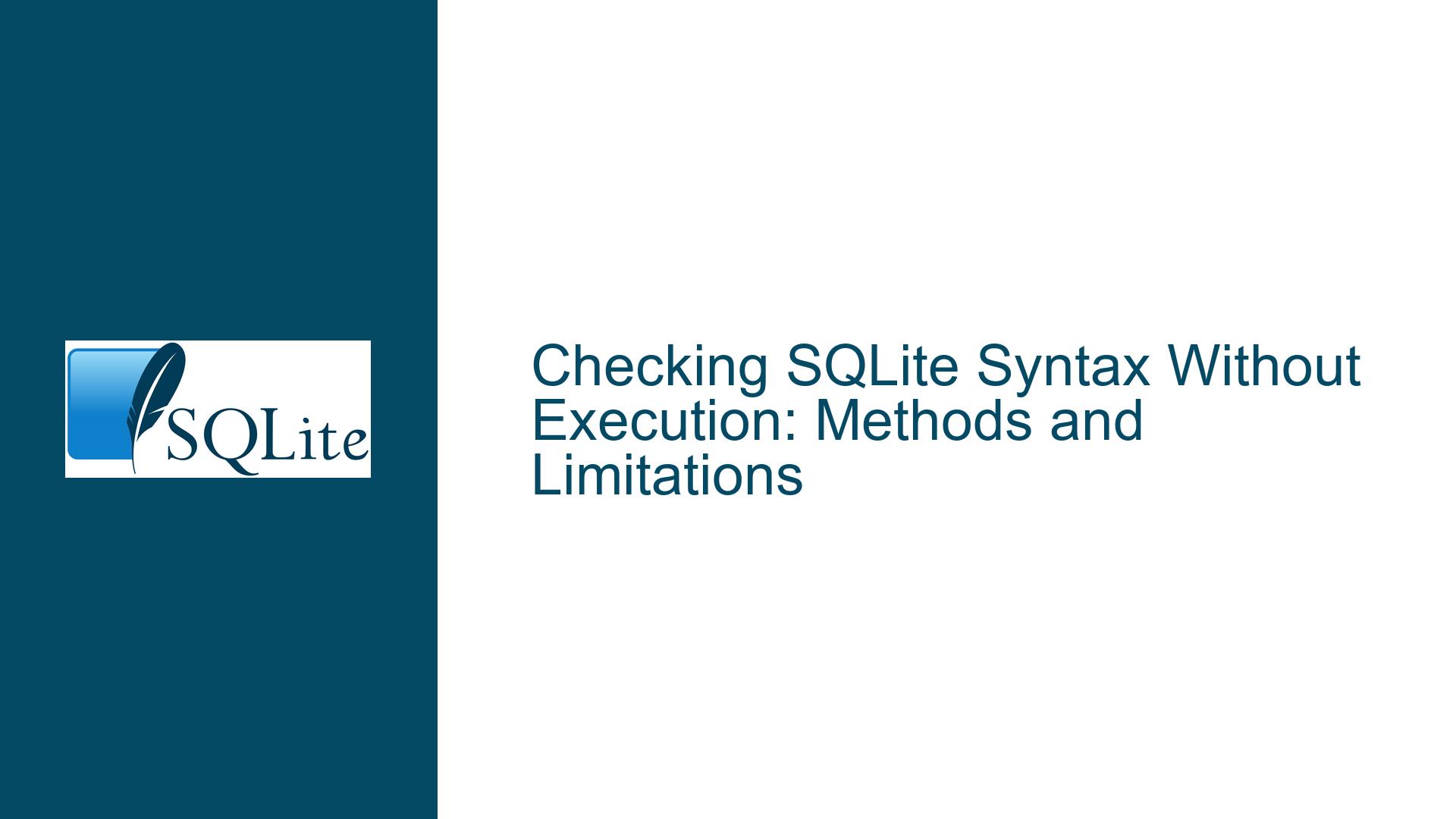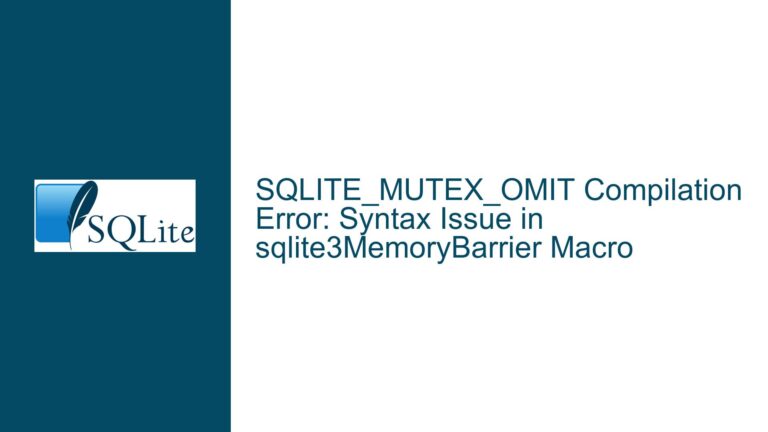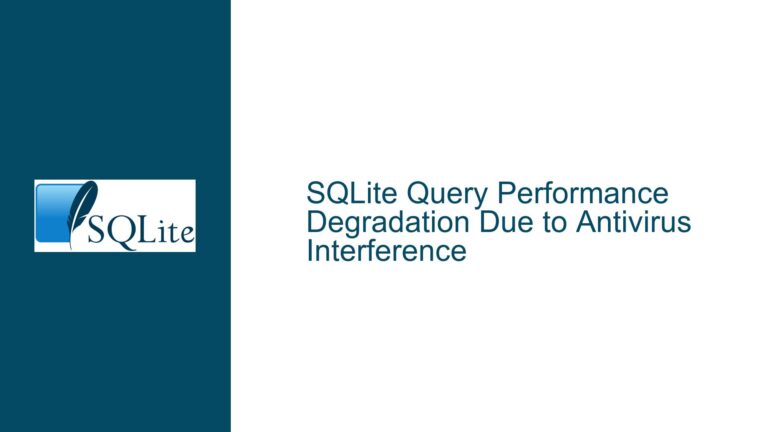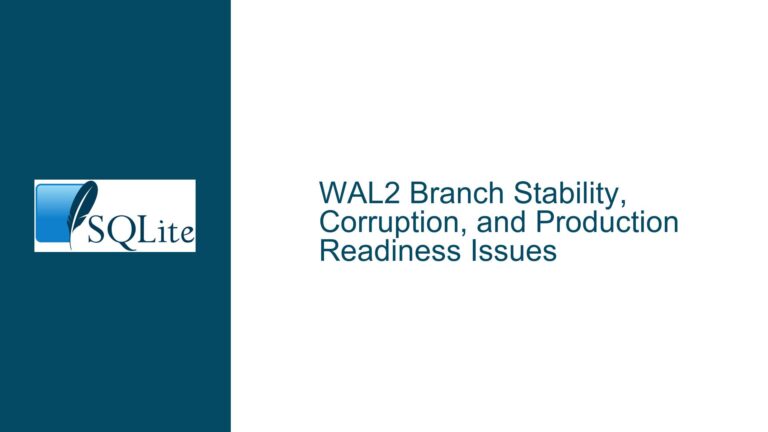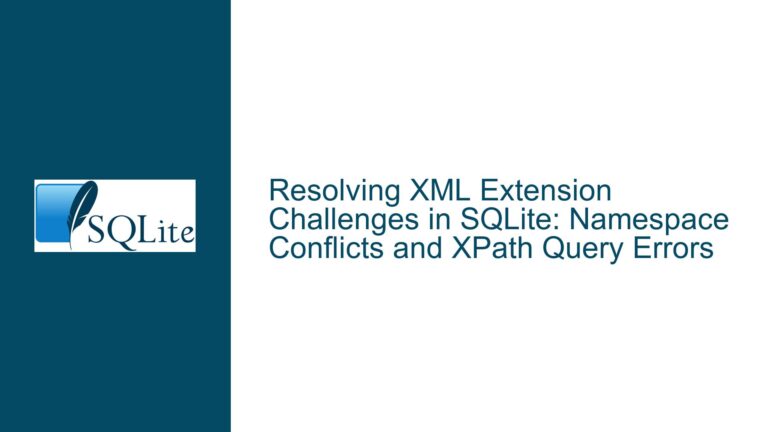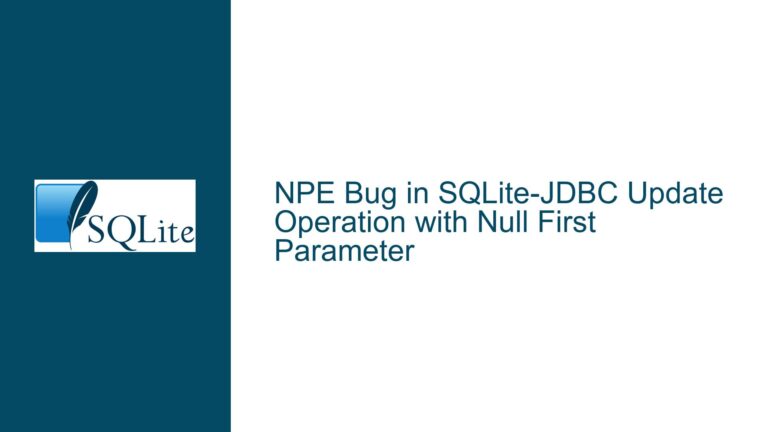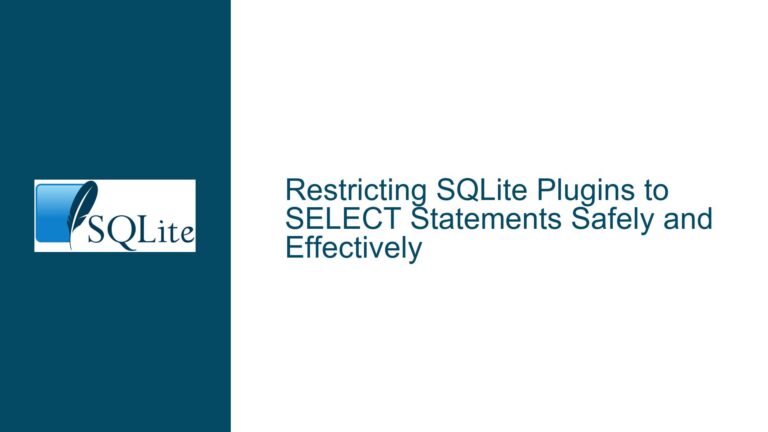Checking SQLite Syntax Without Execution: Methods and Limitations
Understanding the Need for Syntax Validation in SQLite Scripts
The core challenge addressed here revolves around validating SQLite script syntax without executing it. Developers often seek a mechanism analogous to perl -c or linting tools for other languages: a way to catch basic errors (e.g., misspelled keywords, mismatched quotes, or unterminated comments) before running scripts that might modify databases or filesystems. This need arises in scenarios such as editor integrations, CI/CD pipelines, or automated testing frameworks where premature execution could lead to data corruption, unintended side effects, or inefficiencies due to repeated full execution cycles.
SQLite’s architecture complicates this task. Unlike interpreted languages where syntax checking can be decoupled from execution, SQLite’s parser and virtual machine (VDBE) are tightly integrated. The parser not only validates syntax but also resolves schema references (tables, columns) and generates bytecode for execution. This means that traditional "syntax-only" checks are inherently limited, as even basic validation steps may require accessing schema metadata or preparing execution plans. Furthermore, the SQLite command-line interface (CLI) includes non-SQL directives (e.g., .import, .output) that are processed before SQL parsing, creating additional complexity for tools attempting to isolate pure SQL validation.
A critical distinction must be made between syntactic validity and semantic correctness. For example, the statement SELECT non_existent_column FROM existing_table; is syntactically valid (correct keyword order, proper semicolon termination) but semantically incorrect if the column does not exist. Many validation tools conflate these layers, but the original use case explicitly seeks to avoid semantic checks to prioritize speed and safety.
Architectural and Tooling Limitations in SQLite’s Parsing Workflow
1. Tight Integration of Tokenization, Parsing, and Bytecode Generation
SQLite’s parser (generated via the Lemon parser generator) is deeply intertwined with its tokenizer and bytecode emitter. When a statement is processed:
- Tokenization splits input into keywords, literals, and operators.
- Parsing applies grammar rules to build an abstract syntax tree (AST).
- Code Generation translates the AST into VDBE bytecode for execution.
These stages are not modularized for standalone use. Extracting a "syntax-only" checker would require significant code modification to bypass code generation and schema resolution, which is impractical for most users.
2. CLI Limitations and Side Effects
The SQLite CLI (sqlite3) executes scripts in a linear fashion, processing both SQL statements and dot-commands (e.g., .tables, .schema). Dot-commands are not part of SQL syntax and are handled by the CLI itself, not the SQLite library. This creates two problems:
- Side Effects: Executing a script with
CREATE TABLEorINSERTstatements alters the database. Wrapping scripts in transactions with rollbacks mitigates this but does not eliminate side effects from DDL statements (which may commit implicitly) or filesystem operations via dot-commands. - Error Reporting: The CLI’s error messages are designed for interactive use, lacking machine-readable structure. While recent versions have improved formatting, they still mix syntax errors, semantic errors, and runtime exceptions without clear differentiation.
3. Ambiguity in Statement Boundaries
SQLite uses semicolons to delimit statements, but this is complicated by:
- Nested semicolons in string literals or subqueries.
- Triggers or procedural code blocks (e.g.,
BEGIN...END).
Thesqlite3_complete()C function checks if a string contains one or more complete SQL statements, but it only verifies balanced quotes and semicolon placement—useful for basic validation but insufficient for deep syntax analysis.
4. Lack of a Public Tokenizer API
SQLite’s tokenizer is not exposed as a standalone API. Third-party tools attempting syntax checks must either:
- Use
sqlite3_prepare_v2(), which performs full parsing and resolution. - Reimplement the tokenizer/parser using unofficial forks or external libraries.
This forces a tradeoff: lightweight checks miss critical errors, while accurate checks require full preparation, which may connect to a database and resolve schema objects.
Strategies for Syntax Validation and Workarounds
1. Leverage sqlite3_prepare_v2() with a Temporary Database
The C API function sqlite3_prepare_v2() parses and prepares a statement without executing it. While this performs semantic checks (e.g., table existence), it can be adapted for syntax validation:
sqlite3 *db;
sqlite3_open(":memory:", &db); // Use an in-memory database
const char *sql = "SELECT invalid_syntax FROM;";
sqlite3_stmt *stmt;
int rc = sqlite3_prepare_v2(db, sql, -1, &stmt, NULL);
if (rc != SQLITE_OK) {
fprintf(stderr, "Error: %s\n", sqlite3_errmsg(db));
}
sqlite3_finalize(stmt);
sqlite3_close(db);
Pros:
- Catches most syntax and semantic errors.
- Avoids side effects by using
:memory:or temporary files.
Cons:
- Requires a database connection.
- Fails on dot-commands (must be stripped beforehand).
- Overhead from initializing a database instance.
2. Use the sqlite3_complete() Function for Basic Checks
This function verifies whether a string contains one or more complete SQL statements:
int is_complete = sqlite3_complete("SELECT 1"); // Returns 1
int is_incomplete = sqlite3_complete("SELECT 1 FROM"); // Returns 0
Pros:
- No database connection required.
- Fast and lightweight.
Cons:
- Does not validate syntax beyond quote/semicolon balance.
- Misses errors like misspelled keywords or invalid clause ordering.
3. Preprocess Scripts to Isolate SQL from Dot-Commands
Since dot-commands are CLI-specific, stripping them allows pure SQL validation:
# Strip lines starting with '.'
sed '/^\./d' script.sql | sqlite3 :memory: -batch -init /dev/null
Pros:
- Avoids CLI-specific side effects.
- Simplifies validation to SQL-only content.
Cons:
- Manual preprocessing complicates automation.
- May remove valid SQL in rare cases (e.g., strings containing
.).
4. Third-Party Parsers and Editor Integrations
Projects like sqlite-parser (a JavaScript implementation) or sqlglot provide standalone parsing:
const { parser } = require('sqlite-parser');
const query = parser('SELEC typo FROM table');
console.log(query.errors); // Outputs syntax errors
Pros:
- Language-agnostic validation.
- No database dependencies.
Cons:
- May lag behind SQLite’s latest syntax.
- Varying levels of error detail and accuracy.
5. Custom Solutions Using the Lemon Parser
For advanced users, SQLite’s parser can be extracted and modified:
- Clone the SQLite source.
- Modify
parse.yto remove actions related to code generation. - Rebuild the parser as a syntax-checking library.
Pros:
- Accurate, up-to-date syntax validation.
- Full control over error reporting.
Cons:
- High development and maintenance overhead.
- Requires familiarity with parser generators (Lemon).
6. Editor-Specific Workflows
In Vim, combine sqlite3_complete() with pattern matching:
function! SQLSyntaxCheck() abort
let lines = join(getline(1, '$'), "\n")
if sqlite3_complete(lines)
echo "Syntax appears valid"
else
echo "Incomplete or invalid syntax"
endif
endfunction
Pros:
- Immediate feedback during development.
- Customizable to project needs.
Cons:
- Limited to basic checks.
- False positives/negatives likely.
7. Transaction Wrapping with Rollback
For scripts without DDL or dot-commands, wrap execution in a transaction:
BEGIN;
-- Original script here
ROLLBACK;
Pros:
- Prevents persistent changes.
- Works with existing CLI tools.
Cons:
- Fails on statements that implicitly commit (e.g.,
CREATE TABLE). - Does not suppress filesystem operations (e.g.,
.output file.txt).
Conclusion and Recommendations
The optimal approach depends on the required level of validation and integration complexity:
- For basic editor integration, use
sqlite3_complete()with preprocessing to remove dot-commands. - For CI/CD pipelines, combine
sqlite3_prepare_v2()with a temporary database and error capturing. - For cross-platform tools, adopt third-party parsers while monitoring their compatibility with SQLite versions.
Developers should also advocate for SQLite enhancements, such as a --dry-run CLI flag or a public tokenizer API, to streamline syntax validation in future releases. Until then, hybrid solutions leveraging existing APIs and preprocessing offer the best balance of safety and accuracy.
